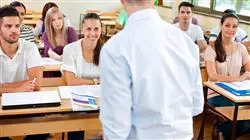University certificate
The world's largest faculty of education”
Introduction to the Program
These days, bilingual education is an innovative approach that goes beyond the mere teaching of a language and so has undergone methodological, curricular and organizational changes"

Conventional methods of teaching a second language, such as demonstrative classes or mechanical exercises, slow down learning and seriously affect students' motivation, as confirmed by statistical data reflecting the failure of the traditional system and methodology.
The pedagogical proposal focuses on the adaptation of teacher training to social, pedagogical and technological changes. Just as students learn in a different way, teachers must also teach in a different way, which is why TECH wants future teachers to be qualified in teaching, experimenting with the methods they will later use.
In educational terms, bilingualism refers to the use of two languages as a vehicle for teaching the content of one or more subjects within the curriculum.
In the field of teaching, methodological trends and approaches not only require an adaptation in the way a second language is taught in the classroom, but also a new approach.
Update your knowledge through the Professional master’s degree in Bilingual Education in High School"
This Professional master’s degree in Bilingual Education in High School contains the most complete and up to date program on the market. The most important features include:
- Over 75 cases presented by experts in bilingual education in high school education
- The graphic, schematic, and practical contents with which they are created provide scientific and practical information on the disciplines that are essential for professional practice
- Methodological and application innovations in bilingual education in secondary and high school
- Practical exercises where the self-assessment process can be carried out to improve learning
- An interactive learning system based on making decisions about the situations posed
- All of this will be complemented by theoretical lessons, questions to the expert, debate forums on controversial topics, and individual reflection assignments
- Content that is available from any fixed or portable device, with an Internet connection
This Professional master’s degree is the best investment you can make when choosing a refresher program for two reasons: in addition to updating your knowledge in Bilingual Education in High School, you will obtain a qualification from TECH Global University"
The program’s teaching staff includes professionals belonging to the field of teaching and bilingual education, who contribute to this program the experience of their work, in addition to recognized specialists belonging to various prestigious educational institutions.
The multimedia content, developed with the latest educational technology will provide the professional with situated and contextual learning, i.e., a simulated environment that will provide immersive learning, programmed to train in real situations.
This program is designed around Problem-Based Learning, by means of which the teachers must try to solve the different situations of professional practice that arise during the educational program. For this purpose, the teacher will be assisted by an innovative interactive video system, developed by recognized experts in the field of bilingual education with extensive teaching experience.
The Professional master’s degree allows students to practice in simulated environments, which provide immersive learning, programmed to train in real situations"

It includes practical cases, to bring the content of the program as close as possible to reality"
Why study at TECH?
TECH is the world’s largest online university. With an impressive catalog of more than 14,000 university programs available in 11 languages, it is positioned as a leader in employability, with a 99% job placement rate. In addition, it relies on an enormous faculty of more than 6,000 professors of the highest international renown.

Study at the world's largest online university and guarantee your professional success. The future starts at TECH”
The world’s best online university according to FORBES
The prestigious Forbes magazine, specialized in business and finance, has highlighted TECH as “the world's best online university” This is what they have recently stated in an article in their digital edition in which they echo the success story of this institution, “thanks to the academic offer it provides, the selection of its teaching staff, and an innovative learning method aimed at educating the professionals of the future”
A revolutionary study method, a cutting-edge faculty and a practical focus: the key to TECH's success.
The most complete study plans on the university scene
TECH offers the most complete study plans on the university scene, with syllabuses that cover fundamental concepts and, at the same time, the main scientific advances in their specific scientific areas. In addition, these programs are continuously being updated to guarantee students the academic vanguard and the most in-demand professional skills. In this way, the university's qualifications provide its graduates with a significant advantage to propel their careers to success.
TECH offers the most comprehensive and intensive study plans on the current university scene.
A world-class teaching staff
TECH's teaching staff is made up of more than 6,000 professors with the highest international recognition. Professors, researchers and top executives of multinational companies, including Isaiah Covington, performance coach of the Boston Celtics; Magda Romanska, principal investigator at Harvard MetaLAB; Ignacio Wistumba, chairman of the department of translational molecular pathology at MD Anderson Cancer Center; and D.W. Pine, creative director of TIME magazine, among others.
Internationally renowned experts, specialized in different branches of Health, Technology, Communication and Business, form part of the TECH faculty.
A unique learning method
TECH is the first university to use Relearning in all its programs. It is the best online learning methodology, accredited with international teaching quality certifications, provided by prestigious educational agencies. In addition, this disruptive educational model is complemented with the “Case Method”, thereby setting up a unique online teaching strategy. Innovative teaching resources are also implemented, including detailed videos, infographics and interactive summaries.
TECH combines Relearning and the Case Method in all its university programs to guarantee excellent theoretical and practical learning, studying whenever and wherever you want.
The world's largest online university
TECH is the world’s largest online university. We are the largest educational institution, with the best and widest online educational catalog, one hundred percent online and covering the vast majority of areas of knowledge. We offer a large selection of our own degrees and accredited online undergraduate and postgraduate degrees. In total, more than 14,000 university degrees, in eleven different languages, make us the largest educational largest in the world.
TECH has the world's most extensive catalog of academic and official programs, available in more than 11 languages.
Google Premier Partner
The American technology giant has awarded TECH the Google Google Premier Partner badge. This award, which is only available to 3% of the world's companies, highlights the efficient, flexible and tailored experience that this university provides to students. The recognition as a Google Premier Partner not only accredits the maximum rigor, performance and investment in TECH's digital infrastructures, but also places this university as one of the world's leading technology companies.
Google has positioned TECH in the top 3% of the world's most important technology companies by awarding it its Google Premier Partner badge.
The official online university of the NBA
TECH is the official online university of the NBA. Thanks to our agreement with the biggest league in basketball, we offer our students exclusive university programs, as well as a wide variety of educational resources focused on the business of the league and other areas of the sports industry. Each program is made up of a uniquely designed syllabus and features exceptional guest hosts: professionals with a distinguished sports background who will offer their expertise on the most relevant topics.
TECH has been selected by the NBA, the world's top basketball league, as its official online university.
The top-rated university by its students
Students have positioned TECH as the world's top-rated university on the main review websites, with a highest rating of 4.9 out of 5, obtained from more than 1,000 reviews. These results consolidate TECH as the benchmark university institution at an international level, reflecting the excellence and positive impact of its educational model.” reflecting the excellence and positive impact of its educational model.”
TECH is the world’s top-rated university by its students.
Leaders in employability
TECH has managed to become the leading university in employability. 99% of its students obtain jobs in the academic field they have studied, within one year of completing any of the university's programs. A similar number achieve immediate career enhancement. All this thanks to a study methodology that bases its effectiveness on the acquisition of practical skills, which are absolutely necessary for professional development.
99% of TECH graduates find a job within a year of completing their studies.
Professional Master’s Degree in Bilingual Education in High School
Inculcating the use of several languages from an early age in educational centers is essential to ensure better opportunities for growth both personally and professionally. This is why teachers seek to update their knowledge to provide the best tools during the training process of their students. Because of this, at TECH we have developed a Master's in Bilingual Education in High School and Baccalaureate, a high-level program with which you will become a specialist in the principles of bilingualism. You will learn in depth about content and language integrated learning (CLIL), the educational and teaching methodology for bilingual education and the management of oral skills to listen and speak a second language perfectly. In addition, you will be able to provide an innovative, creative and effective teaching model based on the latest educational technology on the market.
Specialize in the largest School of Education
At TECH Global University we provide you with the necessary tools to highlight your professional profile and acquire new skills to expand your field of knowledge. This curriculum will be complemented with a pedagogical proposal adaptable to social and technological changes, which will allow students to learn in an innovative and efficient way. Over 1,500 hours you will specialize to become an expert in methodological, curricular and organizational transitions, with the objective of applying changes in the conventional methods of English language teaching. In this way, you will be able to reinforce topics such as, reading comprehension, writing skills in L2 (English), the linguistic system and the methodology and teaching of a second language.
Study a Professional Master’s Degree in bilingual education online
We have the most complete and updated program in the industry, you will be able to deepen in the teaching resources in the teaching of a second language and educational research in the learning of English/Spanish. At TECH we provide you with the necessary elements that will help you become a high-level academic expert, since we have unparalleled learning methodologies. You will have multimedia content, practical exercises, theoretical lessons and participative forums to exchange knowledge. In addition, you will have continuous support and accompaniment of teachers with extensive experience in the field who will guide your process to promote the growth of your personal and professional life.







